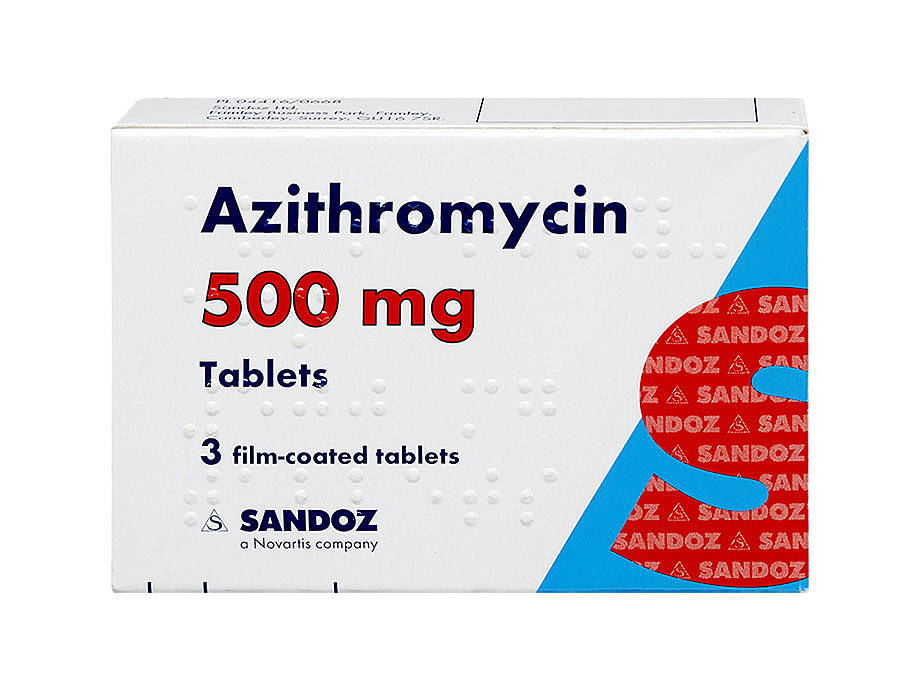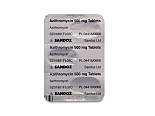







Prices from £19.99
In stock. Simply fill in a brief consultation questionnaire and one of our doctors will review your request today.
-
Azithromycin is an antibiotic treatment for travellers' diarrhoea. It fights the bacteria that cause diarrhoea and is an important part of any traveller's first aid kit.



About Azithromycin For Diarrhoea
-
-
Azithromycin can destroy the bacteria that are responsible for causing diarrhoea, by preventing them producing the proteins they need to survive.
Please note traveller’s diarrhoea is an ‘off-label’ use of azithromycin.
All the medications that we offer are fully licensed within the UK. Some medications, like this one, we prescribe for conditions or circumstances that are outside of the licence (also known as ‘off-label’). Prescribing ‘off-label’ is common practice by healthcare professionals to ensure a medication can safely benefit as many patients as possible. This is always based on updated information and evidence since the product first became available.
-
-
Azithromycin is highly effective in the treatment of bacterially caused diarrhoea. However, overall, it is only 97% effective, as it cannot be used against Giardia or amoebic dysentery. If Azithromycin doesn’t clear up your diarrhoea, you should see a doctor.
-
-
By taking Azithromycin, you can reduce the length of your diarrhoea episode from 3-4 days to 1-2 days. You will know your treatment is working if your symptoms clear up. If the diarrhoea persists, consult a doctor.
-
-
You should start treatment as soon as you notice any of the symptoms of diarrhoea: frequent loose stools, nausea and cramps. The sooner you start treatment, the quicker your recovery will be.
-
-
Yes. This will prevent resistant strains of bacteria developing.
-
-
No. Alcohol will neutralise any positive effects the drug has. This means your diarrhoea won’t be cured effectively.
-
-
An antibiotic such as Azithromycin is the best way to prevent travellers’ diarrhoea caused by bacteria. Azithromycin is particularly effective in South East Asia, because most cases of diarrhoea there are caused by bacteria.
-
-
Yes. You can get this online with ZAVA, provided you are suitable for the treatment.
-
-
Brand names such as Zmax or Zithromax may be used.
-
-
The tablets are white and marked with Pfizer and “250”.
-
-
In the case of minor diarrhoea, take 2 x 250mg Azithromycin tablets as soon as you notice the first symptoms. From this point onwards, take 1 x 250mg tablet a day, but stop this treatment when the symptoms clear completely. In the case of more serious diarrhoea, take 2 x 250mg Azithromycin tablets when you first notice symptoms, then continue to take 1 tablet per day for at least 4 more days. If the diarrhoea persists, consult a doctor. Avoid missing doses, as this will make your treatment less effective, but take the tablet as soon as you remember.
You should take the treatment with a full glass of water and over one hour before a meal, or over two hours after a meal.
-
-
The active ingredient is the Azithromycin. Each tablet will contain 250mg of this. Other ingredients include lactose, magnesium stearate, maize starch, sodium lauryl sulphate, gelatin, iron oxide (black) E172, shellac, propylene glycol, sulphur dioxide and titanium dioxide. If you are allergic to any of these ingredients, you must not take Azithromycin as a treatment for diarrhoea.
-
-
- Allergic reaction (swollen face, eyelids or lips, rash, itching, wheeziness)
- Severe or prolonged diarrhoea, particularly if the stool has blood or mucus in it (this may mean you have serious bowel inflammation)
- Severe skin rash or flaking
- Rapid/irregular heartbeat
- Low blood pressure (feeling faint/dizzy)
-
-
- Stomach cramps
- Feeling sick
- Wind
-
-
- Dizziness
- Headache
- Numbness/pins and needles
- Vomiting and indigestion
- Loss of appetite
- Visual disturbance and deafness
- Skin rash/itching
- Joint pain
- Low lymphocyte count ( a lymphocyte is a type of white blood cell)
- Low blood bicarbonate levels
- Tiredness/ weakness
-
-
- Thrush
- Allergic reactions
- Blistering of genitals, mouth, eyes and skin
- Anxiety
- Skin more sensitive to sunlight
- Reduced sense of touch
- Sleepiness
- Insomnia
- Ringing of the ears
- Heart palpitations
- Chest pain
- Constipation or stomach pain
- Inflammation of the liver
- Loss of strength
- Swelling
-
-
- Agitation
- Vertigo
- Changes in liver function
Side effects which are exceptionally rare and have only been reported in a few cases include fits, feeling hyperactive, muscle weakness, tongue discolouration, pancreatitis, kidney inflammation, jaundice (yellowing of the skin), bruising or prolonged bleeding after injury.
If you notice any of the side effects above, or any changes which have occurred after treatment, inform your doctor right away.
-
-
- You are allergic to any of the ingredients in the Azithromycin tablets, or if you are allergic to any other macrolide antibiotics
- You are taking any medicines derived from ergot, such as ergotamine which is used to treat migraines
-
-
- Kidney problems
- Heart conditions
- Liver problems
-
-
- Warfarin/ other medicines to prevent blood clots
- Ciclosporin (suppresses immune system to prevent rejection after transplant)
- Antacids (for indigestion)
- Digoxin (for heart failure)
- Terfenadine (for hay fever or skin allergy)
You should not take Azithromycin if you are pregnant, trying to get pregnant or breastfeeding without talking to your doctor first.
The tablets will contain lactose. If you are lactose intolerant, do not take the medication without speaking to your doctor first. The sulphur dioxide in rare cases can cause allergic reactions and wheezing.
Azithromycin will not affect your ability to drive or use machines. However, if you think you feel unwell after taking the medication, do not put yourself and others at risk.

Dr Kathryn Basford is a qualified GP who works as a GP in London, as well as with ZAVA. She graduated from the University of Manchester and completed her GP training through Whipps Cross Hospital in London.
Meet our doctorsLast reviewed: 01 Mar 2019
-
Management of travellers’ diarrhoea, BMJ [accessed February 2023]
-
Travellers' Diarrhoea, fitfortravel [accessed February 2023]
-
Antibiotic Therapy for Acute Watery Diarrhea and Dysentery, Military medicine [accessed February 2023]
-
Side effects of azithromycin, National Health Service [accessed February 2023]
-
Azithromycin, NICE/British National Formulary [accessed February 2023]
When travelling to other countries, it’s possible that you will come into contact with bacteria that cause stomach infections. In order to treat common symptoms of this, including diarrhoea, ZAVA offers antibiotic tablets.








